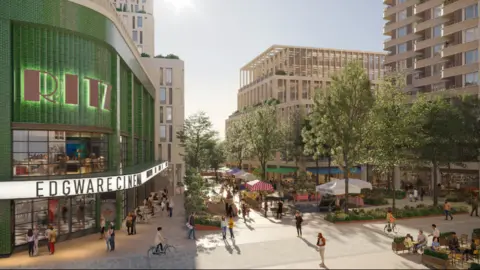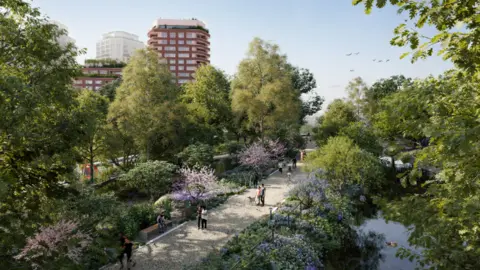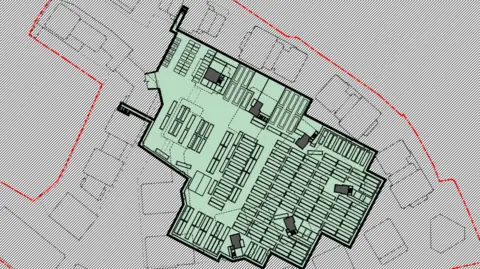Fire safety issues raised over EV bus depot plans
 Ballymore
BallymoreFire safety issues have been raised over plans for a multiple high-rise block development in north London that could eventually house 190 electric buses in a basement depot.
Proposals for the Broadwalk shopping centre and nearby area in Edgware include building more than 3,300 homes, and relocating the existing Transport for London (TfL) bus station.
Concerns raised by London Fire Brigade (LFB) include risks to the structural integrity of the building if a fire broke out in the depot - prompting a community group to call the scheme a "ticking time bomb".
Developer Ballymore said no electric vehicles would be permitted "unless and until" the design had been approved by all relevant authorities.
Potential 'structural collapse'
Under the plans, there would be tower blocks up to 29 storeys high, a hotel, supermarket, cinema and other shops along with improvements to Deans Brook Nature Reserve.
Ballymore said the current TfL bus garage would be relocated and the new basement garage underneath several blocks would initially be designed to house regular buses, with the intention to convert this to house EV buses by seeking permission at a later date.
There have been almost 2,000 public objections since Ballymore submitted the outline planning application in July.
 Ballymore
BallymoreIn a letter to Barnet Council, LFB raised issues over the potential "structural collapse to the blocks of flats" above the garage if there was a fire and said the current application should be considered as a whole.
It said: "The structural integrity of many of the blocks above the bus garage are intrinsically dependent on the structural integrity of the bus garage below.
"The potential for so many EV buses poses risks that are not fully understood by the industry at this point in time."
It comes after a number of fires involving electric buses have occurred in London, which have led to some bus fleets being withdrawn for safety checks.
The letter pointed out several planned facilities were insufficient, such as the provision of only one firefighters' lift. It also said the access road which can bear up to 12.5 tonnes is not suitable for firefighting vehicles.
LFB explained to the council there were not appropriate measures to contain the fire or mitigate further risks, for instance "an incident involving an EV emitting a toxic vapour, and the subsequent potential for a vapour cloud explosion if that cloud is confined".
The brigade questioned whether smoke ventilation and "toxic water runoff" from fighting an EV bus fire had been considered, and asked whether appropriate access would be provided for "the safe removal of any EV car that has been involved in a fire and may still pose a risk of reignition".
The use of fire shutters rather than traditional fire walls was also an issue, with LFB saying it would not provide the same protection given it requires more maintenance and testing.
 Ballymore/Barnet Council
Ballymore/Barnet CouncilA spokesperson for LFB said: "Despite not being a statutory consultee on such planning applications, we would always look to provide a response around the fire strategy in high-rise buildings, particularly where it also involves an emerging fire hazard such as electric vehicles.
"While further detailed plans are expected to be submitted over time, we have highlighted safety issues in our response and we strongly recommend that a development of this scale should be supported by a comprehensive, site-wide fire strategy report."
'Unimaginable risk'
Anuta Zack, from Save Our Edgware, described the scheme as "a ticking time bomb that we refuse to live with".
“The LFB’s assessment makes it clear that the underground EV bus garage presents an unimaginable risk of collapse and toxic fire," she said, adding Barnet Council should reject the application.
Ballymore said on its website it plans to complete the first phase of the project by 2031 including the bus station and garage, with an estimated completion date for the full scheme by 2036.
A spokesperson on behalf of the development said Ballymore welcomed LFB's response "as an essential part of the development’s ongoing consultation process" and it remained "in ongoing dialogue" with the brigade.
The transition to electric vehicles was a "vital part of delivering electric buses across the capital", the spokesperson said.
But, they added: "The garage will not be operational until 2030 at the earliest and we remain clear that no electric vehicles will be permitted unless and until the design has been approved by the London Fire Brigade, Barnet Council, the Health & Safety Executive and Building Control.”
Listen to the best of BBC Radio London on Sounds and follow BBC London on Facebook, X and Instagram. Send your story ideas to [email protected]
